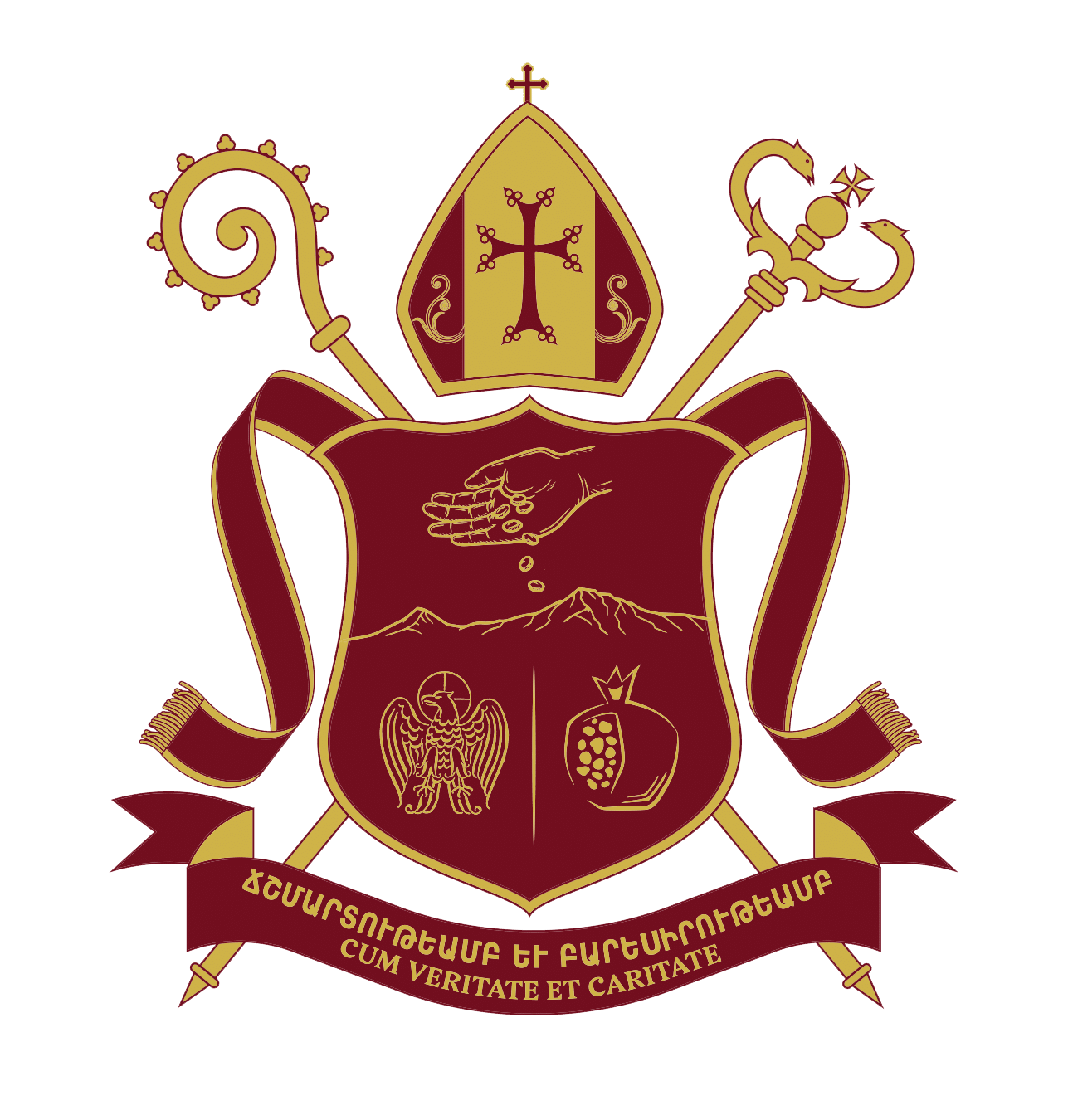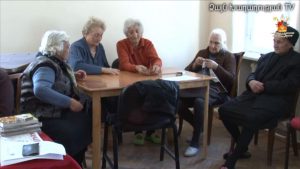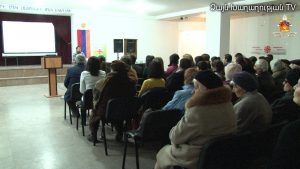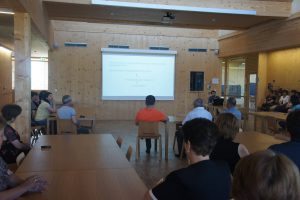- Interview with the newly appointed Director of Caritas Georgia-Anahit Mkhoyan
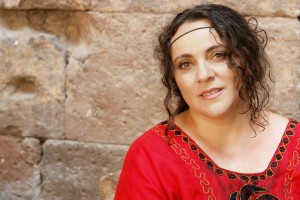
“Caritas is not an organization; it is a way of life”
Anahit Mkhoyan3 February, 2016
The following interview with Anahit Mkhoyan was conducted and submitted to our website by the PR representative of Caritas Georgia- Jana Koprivnakova.
On 5 January, Caritas Georgia started the New Year with a change. His Excellency Raphael Archbishop Minassian assumed the presidency of Caritas Georgia, along with the presidency of Armenian Caritas. Ms. Anahit Mkhoyan became the new director of Caritas Georgia.
“Changes are good if we know where we are going to,” said Mrs. A. Mkhoyan in the opening speech. We wanted to know what the mission of Caritas means for her and for the society. As well as if the mission of Caritas is still being actualized. And especially what can Caritas does for Georgia.
Caritas Georgia is a charitable foundation, an important part of the non-governmental sector in the field of social care. What are the differences between the services offered by Caritas and those of other NGOs working in the social sphere?
The main difference is the approach being used. In reality, Caritas is the social hand of the Church. The word “caritas” itself means love. Caritas operates all over the world and was created by the Catholic Church in order to express the love of God towards people. We are actually the helping hands to deliver necessary aide to people who are in drastic situations. When we do this, the most important thing for us is the dignity of human beings. Because Christ lives in every person, when we approach each person to help them we always consider that Christ lives within them. We have to be careful not only about giving, but about giving in a dignifying way.
In the past you were also involved in Caritas International. What are the main difficulties of Caritas brand?
Actually I would not call them difficulties I think there are so many differences all over the world. I would say what is specific about Caritatis, how they are established. In reality the Church organizes Caritas and in every country Caritas is a local organization. The role of local people and cultural specificities are taken into consideration for the work that is being done. Instead of being created by Caritas Internationalis or Caritas Europa, these organizations act as secretariats and actualize the networking between the Caritases in all over the world, which is vital for keeping both professionalism and spirituality at place. This is the difference between other organizations and Caritas. We receive our mission and governance directives from the Catholic Church, and we implement it adapted to every country. So the difficulty is that sometimes we are working with social policies. For example, with governments we face the difficulty that some church officials think we should not be working with the government on policies that we should be working with impoverished, strained people all the time. It takes us a while to persuade them that working with policies will improve the sustainability of our actions. We cannot be taking care of same persons all the time, as though we are powerful enough to take care of people who again and again fall into poverty and poor living conditions because of war, emergencies, or because they cannot remain in their country, etc. If we do not also invest time into building systems and policies in the countries then we will end up having more and more beneficiaries and we will not be able to cope with them. That is why it is very important for us in every country to invest in building good information and social assistance structures, benefiting our experience because we collect so much information from working with people. We are the grassroots, and this information is needed to create efficient policies. This is the only struggle that we have sometimes. Not from other organizations or governments, but also inside of structure and network of Caritas.
From other side sometimes we face difficulties because we are a faith based organization and ‘the faith’ is applied in our actions, and it is sometimes perceived that we preach Catholicism, in reality Caritas brings the love of Catholic Church and people to the whole world. We are a social hand of the Church and we always have to make it clear to people that this is not about us, it is all about people; about working with human beings and delivering the basic needs when they are in need.
Work in the social sphere is very often invisible. It is not interesting for donors mostly. What do you think about this?
When we build our partnerships we always have to take into consideration if the donor’s mission and goals are compatible with the mission and goals of Caritas. If the donor’s mission is only about visibility then we have to think about the fact that sometimes Caritas has lacked visibility. That lack of visibility is based mostly on the opinion that one hand shouldn’t know what other does. We don’t always think that whenever we do something good we have to advertise that we have done a good deed. In reality it is very important to talk about what we do because the role of Caritas is not only about giving and helping. It is also to educate other people that this kind of help needs to be delivered. Caritas exists in the world as an organization because a lot of people shirk their responsibilities as Christians; therefore, Caritas is not even an organization so much as a way of life.
Can you imagine if one person all over the decided to take responsibility for two or three people? Do you think that Caritas would even be needed anymore? Caritas only exists because people don’t take social responsibility for the others. Caritas covers this gap left when people don’t take responsibility. But we don’t only cover this gap, we also educate people in their daily lives, say, about how to practice their Christian life. When you live a Christian life one of the most important thing in Christian life is to take care and be social responsibility for those who are in need, those who not been given as much as you have been given in your life.
Caritas is based on the Catholic Church. Do you recognize some prejudices against the Caritas brand because that?
Unfortunately, I have to say that sometimes, in some countries, when we ask for funds from big actors like European Commission, or government funds, we can see it. There are worries among them about whether we are going to deliver help in the way that it should be delivered: fairly and justly, without prejudice, without communities working on religious side as well.
Can we change it?
This kind of behaviour is always going to be there. In caritas Georgia, visibility strategies is one of the main points we have to develop. We need to share ‘what Caritas is’. We have a common perception about what we are doing, and when we share information about our work it should be done in the way not to give ground for incorrect perceptions. But we can’t eliminate these perceptions; they will still exist. Our goal for our organization’s information sharing strategy is to minimize the perceptions side of the things.
You were director of Caritas Armenia for 5 years. In Armenia there are more Catholic believers than in Georgia. Do you think Caritas work in Georgia is more difficult?
I would say no… Caritases exist all over the world and there are certain difficulties working in all areas. It cannot be more difficult; it is just difficult in different ways, in different areas. In Armenia, I would not say Armenia has more Catholic population because many Armenian Catholics are living in Georgia as well. I do not know the exact proportion at the moment to give statistics, but I know that it is not the point. For Catholic people Caritas is one of the ways to experience and practice their faith. But Caritas was not created to help only Catholics. Caritas was created to help humanity and when we talk about Jesus, he helped people who needed help. He was not asking about their national or religious position, he helped them because they were human beings. We can say that to be Catholic puts the responsibility on our shoulders. If we practice our faith we should practice it in a way which serves as an example for others, but that does not mean to put restrictions on whom we are helping because I do not think God wants that.
What is your vision for Caritas Georgia?
My vision is to implement the mission (smile). In reality, I am still examining what is on the ground as the manager. First of all I have to assess the situation. I have to get to know the organizational memory. There are many wonderful people working for Caritas. There is so much created. There is so much structure and there is so much good that has been done previously. My vision is for what we need to do now; we do not need to recreate what already exists… the bicycle was already invented. What I will do is to get to know what exists, to see what else more can be done and to increase efficiency of the organization.
Which sphere should be the priority for Caritas Georgia?
Social inclusion and social justice are our priority as it is priority for all Caritases. We are social actors.
Why is the mission of Caritas important for Georgian society?
What we are tackling, what we are doing has no national distribution. The need is different for human beings, but human beings that need assistance support to strive their life are everywhere. Poverty, disability, people in need, youngsters who need support, community structures that need to be improved are everywhere. I think for Georgia, also, Caritas is important to help those who are in need. When I look at Caritas Georgia, it has a very well developed partnership with the government. In many of post-Soviet Union countries, it still needs to be improved. For example in Armenia, there was information exchange between Caritas and government, but no programs are government funded yet. In Georgia the government realizes that Caritas Georgia can and does work, and I am so proud of them that they thought of outsourcing social services, and not only to Caritas Georgia but also to other NGOs in Georgia. I think it is one of the ways that government can be more effective and it gives much space for NGOs to help to government to implement to social service mission in its country. We are bringing new methodologies, new approaches from the broad Caritas network; we adapt them to the country’s perspective and reality, and implement them. In all post-Soviet areas social work was a new thing, and I think Caritas in all post-Soviet areas, as well as Georgia, is one of the core organizations to develop new social work methodologies and create new social support structures which consider human dignity and importance of human beings.
As a foreigner at the head position in Caritas Georgia, can you already see differences between Armenian and Georgian society?
It is an interesting question. Of course there are differences. Culture is different everywhere, especially in mountainous areas and Georgia and Armenia are mountainous countries, where you can find different culture in every city or village. But I always try to concentrate on similarities. If we want to concentrate too much on differences sometimes we tend to separate; if we concentrate on similarities that can unite. In these countries there are lot of similarities because we are all post-Soviet countries. And Soviet Union had developed an interesting mentality which is very similar in all post-soviet countries. In these terms we can see the similarities of being post-Soviet countries with the effects coming from the collapse. Then we took transition phase, transition phase is a different mentality, and then found different ways from a totalitarian regime to a democratic system. We are following the same path in terms of community work, in building new social structures; here we have lot of similarities. Of course we see in the cultural perspective there are differences but we are again conservative cultures. Armenia and Georgia have patriarchal cultures; that is another similarity. The language is different, but it is more about good will. If we want to understand each other and work together then we will commit time in learning. In this case I take the responsibility of learning the language.
You are the new director in Caritas Georgia. What does this mean for you personally for managing people?
I have to say I love my profession! I realized that is one of the most difficult professions in the world. We know that the most difficult creature in the world is human being, and we have to realize that managing human beings is one of the most difficult tasks and when we say difficult it is better to say responsible. I love working with people and I do not like taking advantage of them. Every manager has to realize that he could not be a manager if the staff and team are not there. If you underestimate your team and staff than you are not a manager. Good managers, first of all, need to understand whom they have on board, recognize their intelligence, their capacity. Collect people in one team. Clear up their roles and responsibilities, and put them in position in a way they can start working together very well. A good manager is not one who dictate all the time; a good manager is the one who asks their opinions, analyzes them and finds the most utilitarian decision out of it. If the manager realizes that solo-taken decisions are not as productive. Not because they are wrong, they can be very right decisions with no problems, but when you take it alone, when you do not give the chance to people to share ownership about the decision and then implemented decision with you. So, management is not about directing, it is about working with people to deliver the results that are in our heads and in our mission, in our goals and projects.
What is the biggest challenge for you in professional way right now in position Caritas Georgia director?
Not being Georgian and not speaking the language. I know my job, it is my profession and I have done it before. But I have to turn on my learning mode, as the organization operates in different setting, in different culture. This is the biggest challenge that I have to really handle. In my country I know how things work, because as a part of society we have instinctive knowledge about many things that we do not realize and that speeds up decision making processes. But in Caritas Georgia sometimes I pose while taking decisions and I have to ask more questions, because I still need to realize the cultural background, the historic background, how people feel about and etc.
What was your first step in your position?
My first step was, or still is, to learn and assess the situation. I have already done visits to our projects in different regions, but visiting does not mean to see structures, it mean to spend time with people, talk with them (beneficiaries, staff members, volunteers), see their problems, spend time with them and built trust, so we can work together in future.
What kind of personal features should have person who is working for Caritas?
We cannot say that … this is the strict behaviour that person working in Caritas has to have. But one thing is very important – good will behind the actions for good. Of course, there are organizational values that we have to respect. We are a Cristian organization and if person who works for us is not Christian in religion, then he can respect fundamental human values which is very similar to Christian values. So this is what we have to do and have good will in our heart. Sometimes we cannot control our behaviour. We are human beings and we were created more with emotions than with conscious and wisdom. It is important to know, that sometimes emotions drive us into the wrong direction, but important is that our hearts have the good will and is ready to apologize.
As you mentioned before, Caritas means love. Which kind of love we should represent?
God’s love! Is the purest love ever which is expressed in the first epistle to the Corinthians, chapter 13. Every Caritas spirit is built on the basis of this chapter, and it expresses how pure God’s love has to be. The chapter ended: “And now these three remain: faith, hope and love. But the greatest of these is love.” In some, translations you will find the word “charity” [caritas] instead of “love” as those are the same words. In the reality when we say God it means love, it is one union, it cannot be separate. When we speak about this pure love it is very similar to the love that mother has to towards her child. But sometimes it is more, because mother is a human being, can do faulty things, but God’s love is an eternal verity. This is the kind of love that we have to strive to carry and express towards people.
Information on Anahit Mkhoyan
PROFESSIONAL SUMMARY
Accomplished non-profit leader with over 12 years of management, strategy and operational experience; high-profile executive successful at enhancing organizational productivity and efficiency by effectively directing and supporting operations, services and solutions. Broad experience in consulting different profit and nonprofit organizations on Organizational Development topics.
Work history
Homeland Development Initiative Foundation, Yerevan, Armenia
Executive Director (2014 – present)
Build a solid policy system; improve the organizational structure; improve the financial management systems; Represent the organization in front of the government; Lead the organizational and strategic development processes of the organization; Manage organizational resources; Supervise and monitor all projects and implementation of the strategic plan; Raise funds and present the organization on international and national level; Work on ensuring maximum efficiency of the organization.
Peace Corps Armenia, Yerevan, Armenia
Cross Cultural Consultant (August 2014 – present)
Train Peace Corps new arriving volunteers in Cross Cultural Competence; help volunteers to survive and adapt in new cultural setting; Assist Peace Corps pre-service training staff in cross cultural communication; help Peace Corps staff to develop culturally sensitive training models.
Caritas Armenia, Gyumri, armenia
Executive Director (2009 – 2014)
Lead the organizational and strategic development processes of the organization; Managed human resources (more than 200 people), financial resources (around 2.000.000EUR annual circulation) and physical resources (property, equipment, vehicles, etc.) of the organization; Supervised and monitored all projects and implementation of the strategic plan (around 40 projects); Raised funds and presented the organization on international and national level; with Executive Board members reviewed and developed the strategic plan keeping it compliant with country trends; ensured maximum operational efficiency of the organization; organized and participated Executive Board meetings; actively participated in the working structures of the Caritas International Network.
Caritas Armenia, Gyumri, armenia
Programs Manager (2005 – 2009)
Supervised and monitored all the project management processes and financial flows (almost 30 projects in the amount of almost 1200000EUR); designed and established new projects in compliance with the Strategic Plan of the organization and country development needs; adjusted and adapted methodologies for new projects to ensure maximum efficiency (Health Care projects, Child Protection projects, Elderly Care, Sustainable Reintegration of Migrants, Community Development in Rural Areas, etc.); managed the programmatic staff and organized their professional development processes; represented projects at European level and created new partnerships; fundraised within Caritas Network and out of network organizations (such as European Commission, diplomatic representatives of different countries, etc.).
Experience since 1994 to 2005 “BAZMANKIUN” Consulting Company, Gyumri Director/Owner (2004-2005)
Ordinariate of the Armenian Catholic Church, Gyumri Project Assistant (1997- 2002)
CARITAS ARMENIA, Gyumri, Armenia Project Manager/Domestic Violence (2002 – 2004)
Medecins Sans Frontieres (Belgium), Sevan, Armenia Translator/Interpreter (June – August 1999)
Peace corps, Gyumri, Armenia Language/Cultural Facilitator (2001 May – August)
Ordinariate of the Armenian Catholic Church, Gyumri Administrative Assistant (1994- 1997)
EDUCATION
Walden University, US (2012 – 2014)
MPA in International Non-Government Management
Gyumri pedagogical institute, GYUMRI, ARMENIA
Earned diploma, Department of Foreign Languages, English (1992-1997)
Language Skills
Armenian (Native), English (Advanced), Russian (Advanced), French (Intermediate), Italian (Conversational)
Consulting experience
For national and international organizations in Armenia and abroad
Cross Cultural Competence; Organizational Assessment and development; Human Resource Management; Volunteer Motivation and Orientation; Fundraising; Financial Management and Budgeting; Project Development and Management; Common Management Standards/Risk Management
Memberships
Member of ASPA (American Society of Public Administrators) since 2012
Administrative Board Member at Regional Development Foundation of Armenia since 2014
Administrative Board member of “Warm Hearth” Foundation since 2006
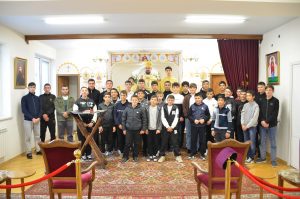 Trainings for Ministrants of Holy Liturgy
Trainings for Ministrants of Holy Liturgy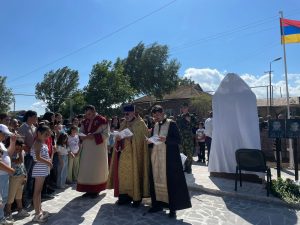 A Cross Stone Dedicated to the Heroes of Artsakh War Was Anointed in Mets Sepasar
A Cross Stone Dedicated to the Heroes of Artsakh War Was Anointed in Mets Sepasar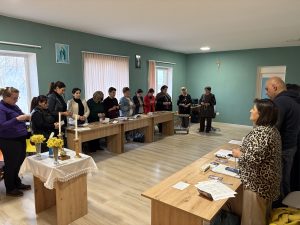 Days of Retreat. Holy Eucharist is the Missionary Pivot of the Legion of Mary
Days of Retreat. Holy Eucharist is the Missionary Pivot of the Legion of Mary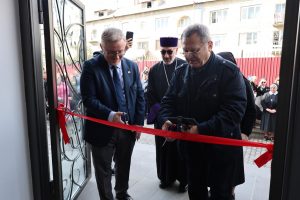 Another Cradle of Charity and Ministry: Inauguration of Diramayr Hayastani Youth Center
Another Cradle of Charity and Ministry: Inauguration of Diramayr Hayastani Youth Center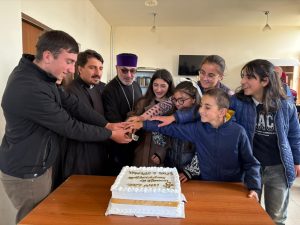 His Excellency Kevork Archbishop Noradounguian served a Holy Mass in St. Nshan church in Bavra
His Excellency Kevork Archbishop Noradounguian served a Holy Mass in St. Nshan church in Bavra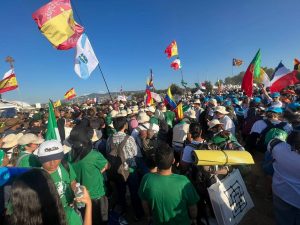 Summarizing Two Days: Jubilee Pilgrimage to Rome
Summarizing Two Days: Jubilee Pilgrimage to Rome
